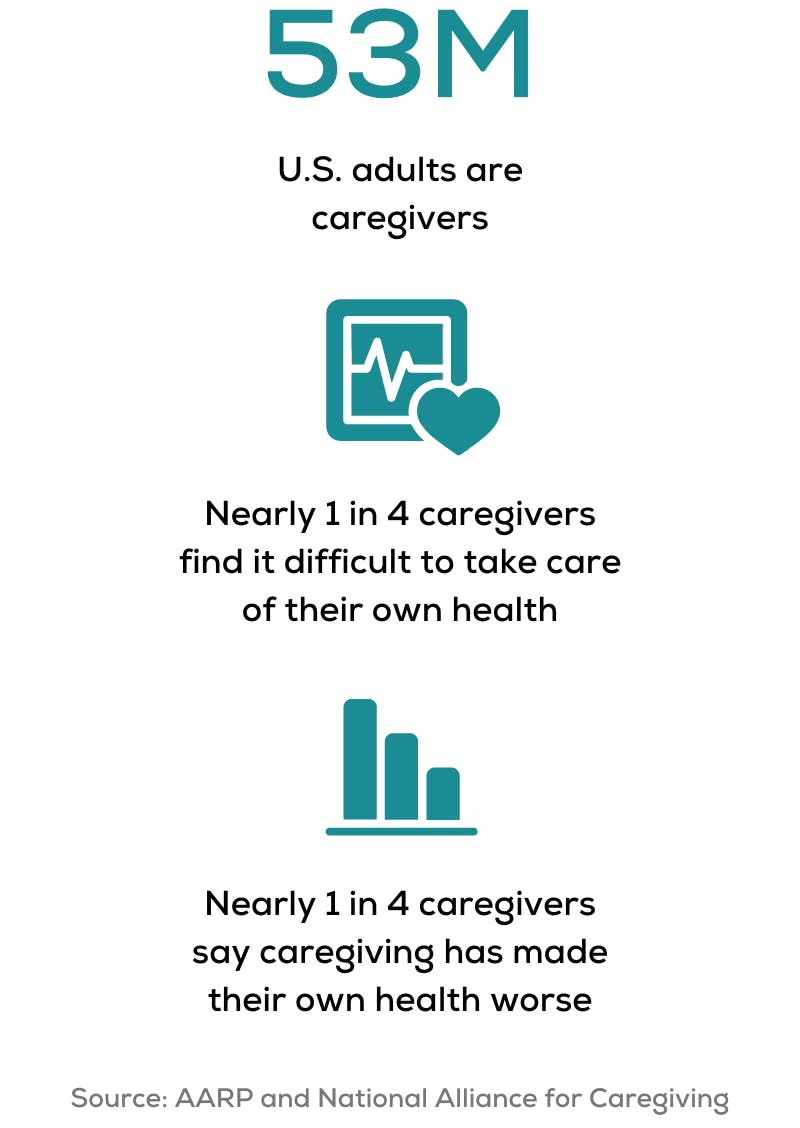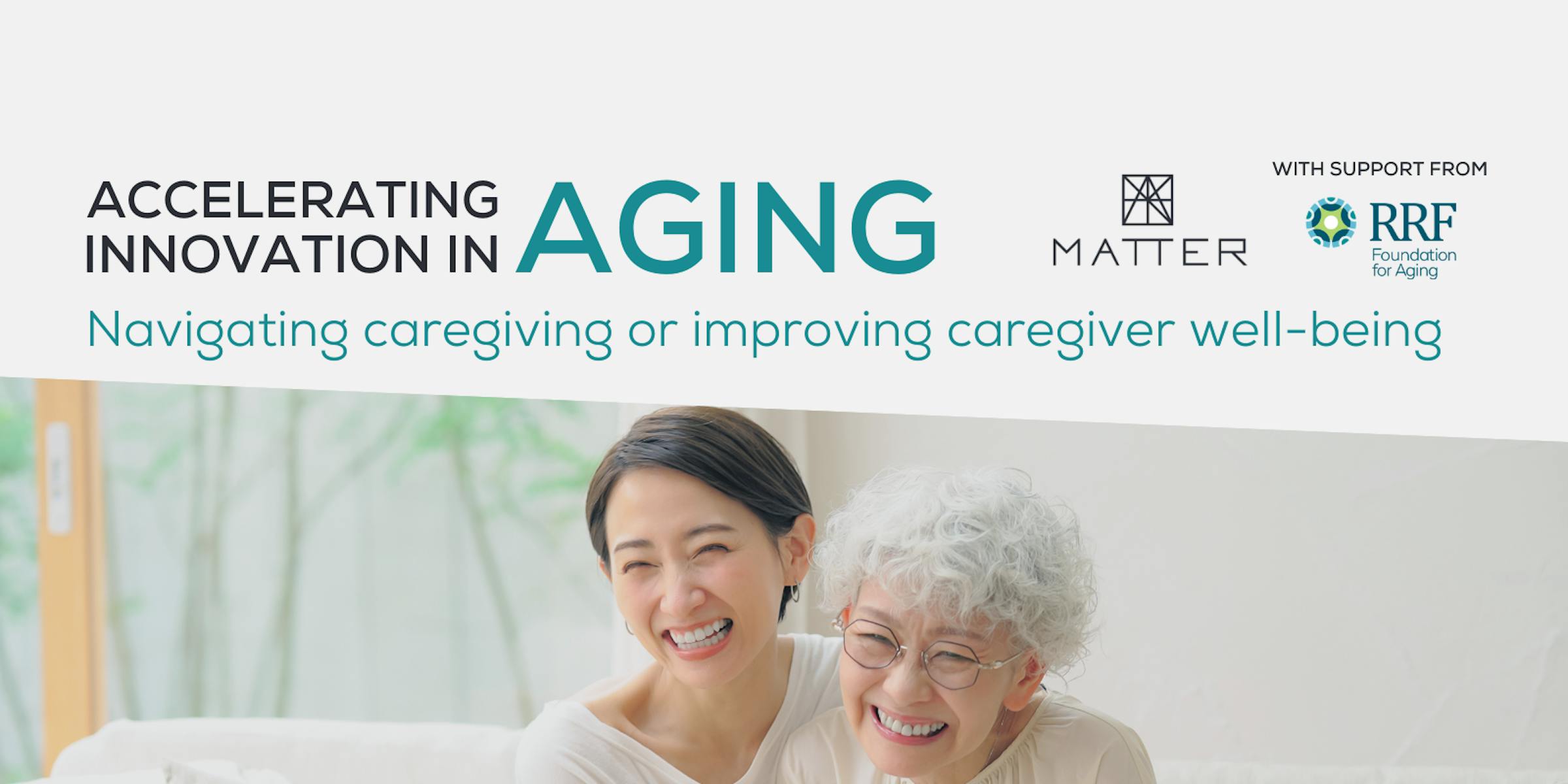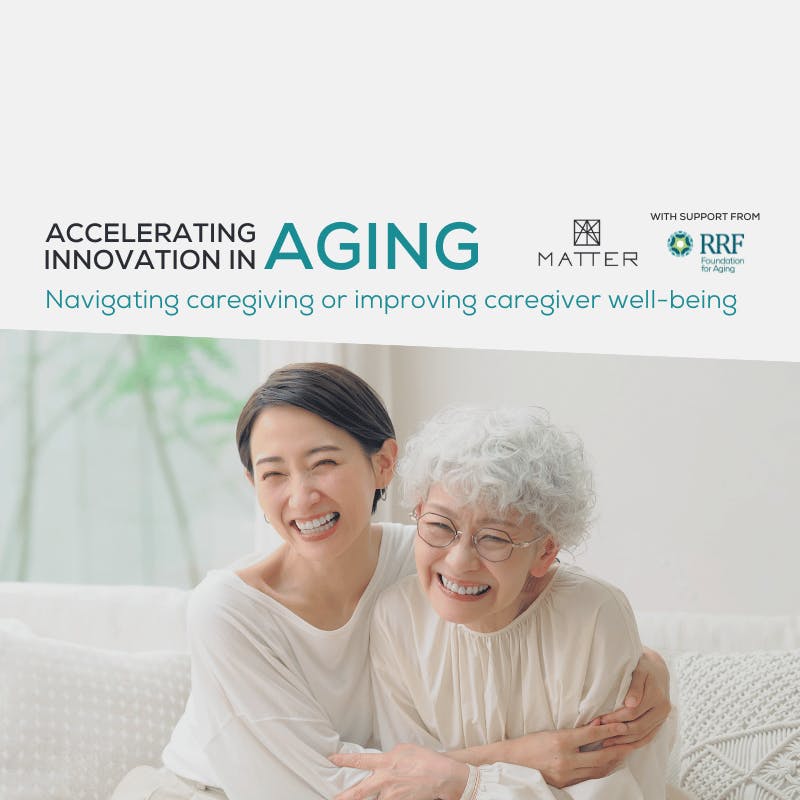Challenge statement
How can we leverage technology-enabled innovations to navigate caregiving or improve caregiver well-being?
Background
In 2020, a total of 53 million adults in the U.S. were family caregivers, representing more than a 20 percent increase since 2015.1 Today, family caregivers are overwhelmed and overburdened with navigating and juggling the disparate and perplexing responsibilities of caregiving while trying to maintain their own self-care and manage their personal responsibilities.
Family caregivers often do more than provide care for their loved ones — they are medical coordinators, guardians, personal assistants, support systems and family members.2 The current lack of systemic support for caregivers provides a ripe opportunity for creative solutions that provide intervention and support at many touchpoints.

On top of their many responsibilities, it’s important for caregivers to take care of their own health in order to continue providing the best care for their loved ones. While many caregivers feel their role has given them a sense of purpose or meaning (51 percent), these positive emotions often coexist with feelings of physical, emotional and financial stress or strain.1
Moreover, research has shown that Black and Hispanic caregivers perform more caregiving and report greater financial burden than non-Hispanic white caregivers.3 One of the biggest challenges for caregivers from underrepresented communities is the lack of culturally responsive resources and services, which has led to disproportionately negative effects on well-being of the caregiver and the person they are caring for.4
With more than one in five adults in the U.S. being unpaid family caregivers, chances are that most, if not all, of us will become a caregiver at some point in our lives.1 More support for innovation in the caregiving space will increase the potential for improved caregiving experiences for us all.


MATTER, with support from RRF Foundation for Aging, has opened applications for 2023 Accelerating Innovation in Aging and invites innovators with solutions to navigate the caregiving experience or support caregiver well-being to apply to the accelerator. Focus areas include but are not limited to:
- Platforms or solutions that connect caregivers to professionals to communicate; potential addition for solutions that also connect in the patient
- Information tracking and sharing
- Caregiver support and training resources
- Assistive devices
- Remote patient monitoring
- Natural language processing and machine learning
- Mental, emotional and holistic health
Learn more about common experiences of caregivers in the U.S. from our caregiver profiles.
Benefits of participation
This twelve-week, cohort-based accelerator will provide participants with access to mentorship, exclusive resources and interactive curriculum from subject matter experts to build their solutions and refine their value propositions. One winning solution will receive a $10,000 cash award.
Accelerator participants should expect to:
- Engage with other cutting-edge startups
- Network with peers and leading influencers
- Gain exposure to the RRF Foundation for Aging and MATTER communities
- Validate their solutions and refine their value propositions
- Pitch to potential investors, partners and clients at a private Demo Day and a public Demo Day
- Receive a free, six-month MATTER membership
Timeline
May 31: Applications open
July 16: Applications close
July 24–July 28: Meetings with top candidates
August 2: Cohort announced
August 7–October 27: Accelerator
October 24: Private Demo Day
October 26: Public Demo Day


Who should apply?
We’re seeking entrepreneurs who are developing a technology to navigate caregiving or improve caregiver well-being. This global call for solutions is open to individuals and teams from across the innovation ecosystem — from university researchers, students, entrepreneurs and existing startups of all stages. Solutions can range from early stage concepts to marketed solutions, and preference will be given to solutions that are culturally inclusive. Participants must be able to dedicate three-to-five hours per week to accelerator assignments and activities, such as cohort events, workshops, mentoring sessions and bi-weekly progress check-ins.
See the Accelerating Innovation in Aging FAQs for more information.
Selection criteria
Submissions will be evaluated with the following criteria in mind:
- Ability to clearly articulate the challenge statement addressed in the accelerator description
- Quality, feasibility and scale of proposed solution or technology
- Differentiation of solution within the competitive landscape
- Capability of participant/team to develop and execute solution
- Ability of the solution to help navigate caregiving or improve family caregiver well-being
Submission process
Applications open on May 31, 2023, and close on July 16, 2023, at 11:59pm CT. MATTER will select up to 10 applicants to determine their fit for participation in the program in 30-minute meetings during the week of July 24–July 28, 2023. MATTER will select at least five teams to move on to the accelerator program which begins August 7, 2023.
The Accelerating Innovation in Aging program will run from August 7–October 27, 2023. Participants will give presentations at a private Demo Day on October 24, 2023, and a public Demo Day on October 26, 2023.
See the full Terms & Conditions.
How can I support this program?
To advance innovation in aging, we need a variety of industry stakeholders to collaborate and guide the paths of our participating innovators. We are looking to collaborate with entities across the aging community and beyond: health systems, payers, providers, pharma/biotech/device corporations, investors, researchers, aging and caregiving experts, advocacy groups and community representatives. We are seeking:
Individuals: Deadline to apply is June 23, 2023
Mentors: Mentor startups in the accelerator
Faculty: Lead workshops and sessions throughout the accelerator
Partners: Deadline to apply is June 23, 2023
Offer potential pilots or act as an advisor to the entrepreneurs, helping them validate their solutions and refine their value propositions
If you are interested in learning more about any of the above opportunities to support the Accelerating Innovation in Aging program, please contact aging@matter.health.
Sources:
- “Caregiving in the United States 2020,” AARP and The National Alliance for Caregiving, 2020.
- “The COPD Caregiver’s Toolkit,” National Heart, Lung and Blood Institute, 2022.
- “Racial and ethnic disparities in cancer caregiver burden and potential sociocultural mediators,” National Library of Medicine, 2022.
- “Family Caregiving in Diverse Communities,” The Diverse Elders Coalition and The National Alliance for Caregiving, 2021.
About MATTER
At MATTER, we believe collaboration is the best way to improve healthcare. The MATTER collaborative includes more than 800 current and alumni startups from around the world, working together with dozens of hospitals and health systems, universities and industry-leading companies to build the future of healthcare. Together we are accelerating innovation, advancing care and improving lives. For more information, visit matter.health and follow @MATTERhealth.
About RRF Foundation for Aging
For more than 40 years, RRF Foundation for Aging, formerly The Retirement Research Foundation, has been funding programs that support older adults. The Foundation has awarded more than 5,000 grants worth more than $250 million — all dedicated to improving the quality of life for all of us as we age. RRF’s grantmaking focuses on four priority areas — caregiving, economic security in later life, housing, and social and intergenerational connectedness. These issues are fundamental to allowing all of us to age where we want to and how we want to. RRF was one of the first private foundations to focus exclusively on aging issues, and continues to support a range of advocacy, direct service, research, training, and organizational capacity building efforts, both in Illinois and nationally. Learn more at www.rrf.org.



